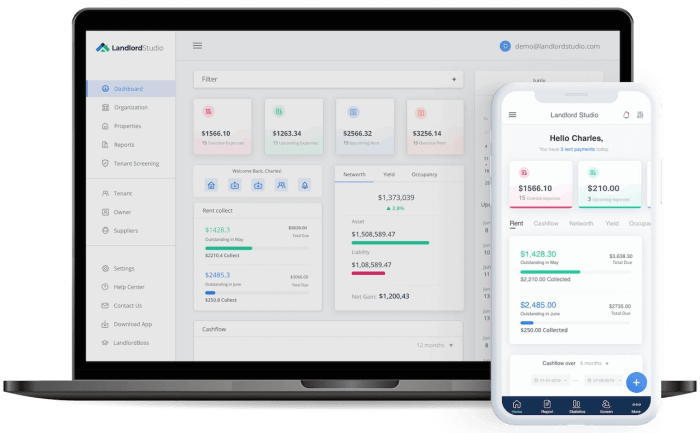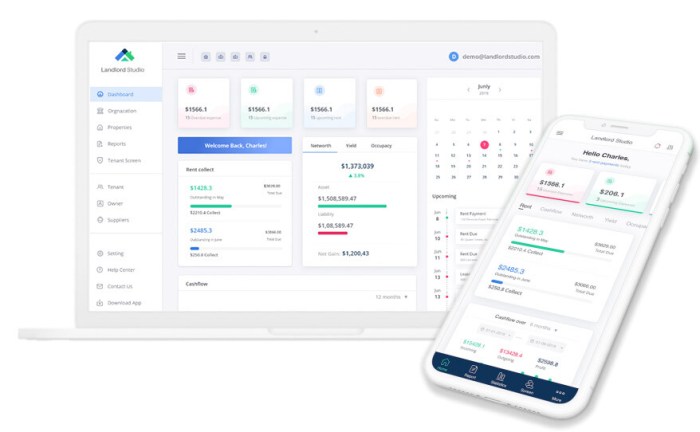Property management software for small landlords – Managing rental properties can be a rewarding but demanding endeavor. For small landlords juggling multiple properties, tenants, and maintenance requests, the task can quickly become overwhelming. Fortunately, property management software offers a lifeline, automating tasks, improving efficiency, and ultimately boosting your bottom line. This comprehensive guide explores the benefits, features, and considerations when choosing the right property management software for your small rental business.

Source: softwareforlandlords.com
We’ll delve into various aspects, from tenant communication to rent collection and financial reporting, ensuring you have all the information you need to make an informed decision.
Understanding the Need for Property Management Software
Many small landlords initially manage their properties using spreadsheets, email, and paper-based systems. While this might work for a single property, scaling becomes exponentially more difficult as your portfolio grows. Property management software centralizes all aspects of your rental operations, offering several key advantages:
Key Benefits of Using Property Management Software:, Property management software for small landlords
- Improved Efficiency: Automate repetitive tasks like rent collection, lease renewals, and tenant communication, freeing up your time to focus on other aspects of your business.
- Reduced Administrative Burden: Streamline paperwork, eliminate manual data entry, and minimize the risk of errors associated with traditional methods.
- Enhanced Tenant Communication: Provide tenants with a convenient online portal for rent payments, maintenance requests, and communication, fostering better tenant relations.
- Better Financial Management: Gain real-time insights into your rental income, expenses, and profitability through comprehensive financial reporting tools.
- Increased Security: Securely store sensitive tenant data and financial information, complying with data privacy regulations.
- Scalability: Easily adapt to your growing portfolio without needing to overhaul your management system.
Essential Features to Look for in Property Management Software
Not all property management software is created equal. When selecting a solution, consider the following key features:
Core Features:
- Tenant Management: Easily add, manage, and track tenant information, including contact details, lease agreements, and payment history.
- Rent Collection: Accept online rent payments through various methods (e.g., credit cards, ACH transfers), automate late fee calculations, and generate payment reminders.
- Lease Management: Create, manage, and track lease agreements, renewals, and notices.
- Maintenance Management: Track maintenance requests, assign work orders to contractors, and monitor repairs.
- Financial Reporting: Generate comprehensive financial reports, including income statements, expense reports, and cash flow statements.
- Communication Tools: Communicate with tenants through secure messaging, email, or a tenant portal.
- Document Storage: Store and access all important documents related to your properties and tenants securely in the cloud.
Advanced Features (Consider these based on your needs):
- Applicant Screening: Integrate with background check services to screen potential tenants.
- Vacancy Management: Manage vacant properties, market them online, and track applications.
- Online Payment Processing: Integrate with payment gateways to process rent payments securely and efficiently.
- Accounting Integration: Integrate with accounting software for seamless financial management.
- Mobile App: Access your property management data on the go through a mobile app.
Choosing the Right Software for Your Needs
The best property management software depends on your specific needs and the size of your rental portfolio. Consider these factors:
Factors to Consider:
- Number of Properties: Software designed for small landlords may not be suitable for larger portfolios.
- Budget: Pricing models vary, from monthly subscriptions to per-unit fees.
- Features: Prioritize the features that are most important to your workflow.
- Ease of Use: Choose software with an intuitive interface that is easy to learn and use.
- Customer Support: Ensure the software provider offers reliable customer support in case you encounter any issues.
- Integrations: Check for integrations with other tools you use, such as accounting software or background check services.
Popular Property Management Software Options for Small Landlords
Several reputable software options cater specifically to the needs of small landlords. Research and compare features, pricing, and reviews before making a decision. Some popular choices include (Note: This is not an exhaustive list and specific features and pricing can change):
- Buildium: A popular choice known for its comprehensive features and scalability.
- AppFolio Property Manager: Offers a robust set of features and excellent customer support.
- Rent Manager: A versatile option suitable for various property types and sizes.
- Cozy: A simpler, more affordable option ideal for smaller portfolios.
- Stessa: Focuses on financial reporting and tracking for rental properties.
Security and Data Privacy Considerations
When choosing property management software, prioritize security and data privacy. Look for software that:
- Uses robust encryption to protect sensitive data.
- Complies with relevant data privacy regulations (e.g., GDPR, CCPA).
- Offers multi-factor authentication for enhanced security.
- Has a clear privacy policy outlining how your data is handled.
Frequently Asked Questions (FAQs)
- Q: Is property management software worth the cost for small landlords? A: Absolutely. The time saved, increased efficiency, and improved financial management often outweigh the cost of the software.
- Q: How much does property management software cost? A: Pricing varies widely depending on the software, features, and number of units managed. Expect to pay a monthly or annual subscription fee.
- Q: Can I switch property management software if I’m not satisfied? A: Yes, you can usually switch to another provider, although data migration might require some effort.
- Q: Is property management software difficult to learn? A: Most reputable software providers offer user-friendly interfaces and tutorials to help you get started.
- Q: What if I have technical issues? A: Reputable providers offer customer support via phone, email, or online chat.
- Q: Can I use property management software for different property types (e.g., single-family homes, apartments)? A: Many software options support various property types. Check the provider’s specifications to ensure compatibility.
Conclusion
Investing in property management software is a smart move for small landlords looking to streamline their operations, improve efficiency, and enhance tenant relationships. By carefully considering your needs, researching available options, and prioritizing security, you can find the perfect software to help you manage your rental properties effectively and profitably.
Call to Action
Ready to simplify your property management? Explore the software options mentioned above and choose the one that best suits your needs. Start your free trial today and experience the difference!
Popular Questions: Property Management Software For Small Landlords
What are the typical costs associated with property management software?

Source: fiveyearfireescape.com
Costs vary widely depending on the features offered and the number of units managed. Some software offers free plans with limited features, while others charge monthly or annual subscription fees. Pricing can range from a few dollars to several hundred dollars per month.
Is property management software difficult to learn?
Most software aims for user-friendliness. Many offer tutorials, support documentation, and even customer support to assist users. The learning curve depends on the software’s complexity and the user’s technical proficiency, but generally, it’s designed to be intuitive.

Source: webflow.com
Can property management software integrate with other tools I use?
Many software options offer integrations with other business tools, such as accounting software or online payment processors. This integration streamlines workflows and reduces the need for manual data entry.
